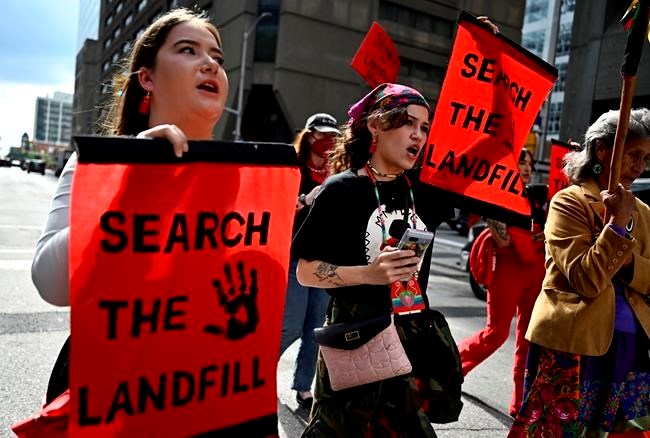OTTAWA — The families of two First Nations women whose remains are believed to be in a Winnipeg-area landfill say they were left feeling disappointed by a meeting with a Liberal cabinet minister in Ottawa.
The remains of Morgan Harris and Marcedes Myran are suspected to be in the Prairie Green Landfill, a private facility north of Winnipeg, and families have been calling for provincial and federal leaders to fund a search.
Their families, who travelled to Ottawa from Manitoba, say they expected Crown-Indigenous Relations Minister Gary Anandasangaree to tell them the federal government would fund the search when they met with him Monday.
Daughter Cambria Harris instead called the meeting a retraumatizing experience, and said the federal government has not yet promised to help.
"It was clear today — the precedent was set — that reconciliation is dead," she said.
Jeremy Skibicki has been charged with first-degree murder in the deaths of Harris, Myran and two others — Rebecca Contois, whose partial remains were found in a different landfill last year, and an unidentified woman Indigenous leaders are calling Mashkode Bizhiki'ikwe or Buffalo Woman.
Families, supporters and organizations including Amnesty International Canada marked Monday as an International Day of Action to Search the Landfills, in an effort to pressure governments to do more. Rallies were scheduled to take place in at least 17 cities, including Winnipeg.
Harris said it was "vile" that Anandasangaree would call for a meeting with the families and their supporters on a day set aside for action.
"I don't think this government realizes that if they do not search that landfill, we have a whole load of community (members) who will go in there with excavators, and we will go and we will retrieve our loved ones," she said.
By not committing to a search in the landfill, Harris said the minister sent a message to others that Canada is content to "leave Indigenous women and girls in the dump."
Geraldine Shingoose, an elder and residential school survivor who was present during the meeting, declined tobacco that Anandasangaree offered her.
Presenting a ceremonial gift of tobacco to Indigenous Peoples is a sign of respect. That the offering was declined shows how poorly attendees felt the meeting went.
Long Plain First Nation Chief Kyra Wilson, who was also present, said the federal government has a responsibility to work with First Nations.
"Don't bring us into a meeting to tell us again that you have no commitment," she said. If the federal government isn't willing to work with them, Wilson said, they'll consider legal action.
Harris pointed to all levels of government for their "beating around the bush and pointing fingers" instead of committing to fund a search of the landfill.
She said Anandasangaree informed the group he still had questions about the feasibility study that was conducted to see if it was possible to search the landfill.
A statement from Anandasangaree said the situation is "heart wrenching, and is part of the sad reality of Missing and Murdered Indigenous Women and Girls," but fell short of committing to a search.
"I understand the frustration of families and communities as they seek progress," the statement said.
"We continue to be in discussion with the Assembly of Manitoba Chiefs and the Long Plain First Nation on next steps. We are committed to this ongoing dialogue and moving forward with work that would address the complexities and findings of the feasibility study."
The federally funded feasibility study found a search of the landfill is possible, but toxic materials and asbestos could pose a risk to workers.
An Indigenous-led committee that produced the study consulted with experts on best practices for mining a landfill, including one who participated in the search of serial killer Robert Pickton's pig farm in British Columbia.
The search could take up to three years and cost $184 million with no guarantee of success. But the report said forgoing a search could be more harmful for the women's families.
"We have proven — more than proven — not only our worth, but that my mother is more than worth searching for and that it is absolutely feasible," said Harris.
Jordan Myran, the sister of Marcedes Myran, spoke at a rally outside Anandasangaree's office. She said she shouldn't have to continuously beg politicians to care about her sister enough to fund a search.
"It's disgusting that it's been 10 months," she said. "My sister was human. My sister deserves a proper burial."
In Manitoba on Monday, that province's premier said she stands by her previous decision not to search the landfill.
"This is a very difficult decision that needed to be made," Premier Heather Stefanson said at a press conference. "We don't want to put any lives at risk in the search of the landfill."
Dozens of people rallied outside the Manitoba legislature wearing red and ribbon skirts, holding signs calling for politicians to greenlight a search of the landfill.
This report by The Canadian Press was first published Sept. 18, 2023.
— With files from Brittany Hobson in Winnipeg
Alessia Passafiume, The Canadian Press



